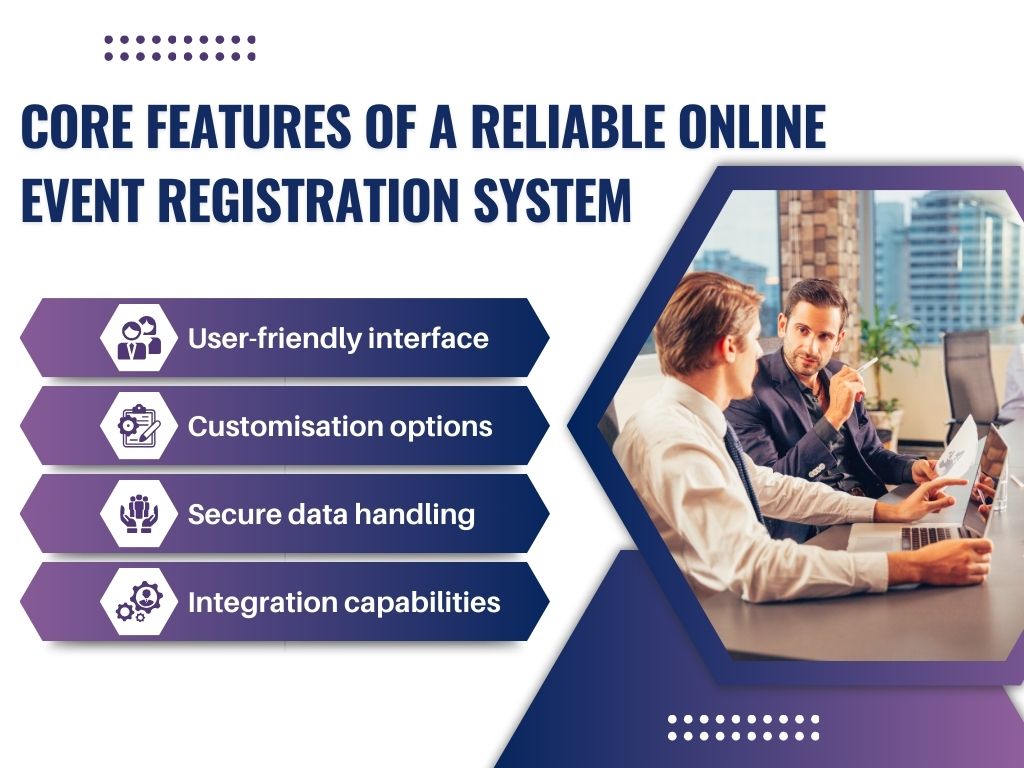The Importance of a Good Online Event Registration Systems
Good preparation and getting the right info on time are key for any successful conference or corporate event. Experienced corporate event planners stress that gathering accurate delegate data is crucial for a successful event. Even it’s not just about gathering delegates; getting bios, abstracts, and images from potential or confirmed presenters is also really important.
When it’s about gathering information, utilising an online registration system equipped with the necessary features can significantly streamline and enhance your event planning process.
Often, people tend to ask for an extra meal at an event because of an undisclosed dietary condition. Similar to this, picture someone picking the wrong conference and wanting to switch sessions just minutes before it starts. This is definitely not something you want to experience, right?
However, it’s a common scenario that every event is bound to encounter its fair share of challenges, but the incorporation of user-friendly technology can prove instrumental in significantly minimising these inevitable issues.
The core features of a reliable online event registration system

1. User-friendly interface
A hallmark of a good online event registration system is its intuitive and user-friendly interface. The platform should facilitate effortless navigation, ensuring that both organisers and attendees can seamlessly engage with the registration process. This emphasis on user experience contributes to increased efficiency across the board.
2. Customisation options
Events vary widely, and so should the registration systems that support them. A robust online event registration system should offer extensive customisation options, empowering organisers to tailor the registration process to the specific needs of their event. This enhances the user experience for attendees and ensures a personalised and tailored approach to event management.
3. Secure data handling
In an era where data security is paramount, a reliable online event registration system places a premium on secure data handling. Encryption protocols and secure storage mechanisms are implemented to safeguard sensitive information such as personal details and payment data. This commitment to security is fundamental in building trust among organisers and attendees.
4. Integration capabilities
Integration capabilities are crucial to elevate overall event management. The online event registration system should seamlessly integrate with other tools, including Customer Relationship Management (CRM) systems, email marketing tools, and payment gateways. This integrated approach provides organisers a holistic resource suite, streamlining the event planning process.
The benefits of a good event registration system
An excellent online registration system creates a single, easy-to-use point of collection for all the information you need from attendees, speakers, and exhibitors, which is its main advantage. Your presenters and delegates can browse and submit information using its front-end. It will feature a back-end where you and your organising team may see, edit, download, and report on data.
It will have reporting features so that you can create all those critical onsite lists with just a single click. Your event website can incorporate a functional registration system that can be shared as a link for distribution. It can also be tailored to include the branding of your business or event.
Let’s explore together the benefits of working with a reasonable registration system:
The benefits for event organisers
1. Efficient planning and organisation
The implementation of online event registration systems significantly streamlines the planning process. Organisers can manage registrations, communicate with attendees, and track RSVPs in real-time. This newfound efficiency translates to smoother event logistics, reducing administrative burdens and allowing organisers to focus on creating memorable experiences.
2. Data-driven decision making
A robust registration system offers detailed insights that empower organisers to make informed, data-driven decisions. Organisations gain valuable information that can enhance future events by analysing registration trends, attendee demographics, and feedback. This analytical approach fosters continuous improvement and a deeper understanding of the target audience.
3. Increased attendance rates
The convenience afforded by online registration leads to higher attendance rates. Attendees are more likely to commit to an event when the registration process is easily accessible from the comfort of their homes or on the go. This, in turn, results in fuller venues, increased engagement, and heightened overall event success.
The benefits for attendees
1. Convenience and accessibility
Online registration eliminates the need for physical forms and manual processes. Attendees can register at their convenience, 24/7, from any device with an internet connection. This level of accessibility ensures a hassle-free experience, fostering a positive impression right from the initial interaction.
2. Real-time updates and communication
An effective registration system facilitates instant communication between organisers and attendees. Real-time updates on event details, changes, or important announcements can be effortlessly conveyed, keeping attendees well-informed and engaged throughout the entire event journey. This seamless communication enhances the overall attendee experience.
3. Personalised experience
Customisable registration forms empower organisers to gather specific information from attendees, tailoring the event experience to individual preferences. This personalisation extends beyond the event itself to post-event engagement and feedback collection. As attendees feel more connected and catered to, overall satisfaction and enjoyment of the event are significantly heightened.
How to determine a good event registration system
Choosing a reliable registration system is crucial for any organisation or event. To determine an excellent free online event registration system, consider the following factors:
1. User-friendly interface
A sound registration system should have an intuitive and user-friendly interface. Participants should be able to navigate through the registration process easily without encountering unnecessary complications.
2. Customisation options
Look for a system that allows customisation to meet your organisation’s needs. This includes adding branding options, custom fields, and tailored registration forms.
3. Scalability
Consider the scalability of the registration system. It should handle a growing number of participants without compromising performance. This is particularly important for events or organisations anticipating increased attendance over time.
4. Integration capabilities
Check for integration capabilities with other tools and platforms. A sound registration system should seamlessly integrate with payment gateways, communication tools, and any other relevant systems your organisation uses.
5. Mobile compatibility
With the increasing use of mobile devices, ensure the registration system is mobile-friendly. Participants should be able to register and access information from their smartphones or tablets without any usability issues.
6. Secure and GDPR compliant
Security is paramount when handling participant information. To safeguard your participants’ privacy, ensure the registration system is secure and compliant with GDPR data protection regulations.
7. Reporting and analytics
A sound registration system should offer robust reporting and analytics features. This allows organisers to track registrations, analyse participant demographics, and gather insights to improve future events.
8. Customer support
Embrace the level of customer support provided by the registration system provider. Having responsive and knowledgeable support can be invaluable in case of any issues or questions.
9. Cost-effectiveness
Consider the overall cost of implementing the registration system, including hidden fees. Compare pricing plans and choose one that aligns with your budget while meeting your requirements.
10. Reviews and recommendations
Research and read reviews from other organisations or event planners using the registration system. This can provide valuable insights into the system’s performance, reliability, and user satisfaction.
Conclusion
Adopting a robust online event registration system is a linchpin of successful event planning in the digital age. The benefits are abundant, from enhancing organisational efficiency and facilitating data-driven decision-making for organisers to providing convenience and a personalised experience for attendees.
Event organisers can elevate their events by recognising the importance of investing in a reliable registration system, ensuring a positive and memorable experience for all stakeholders involved.








